8 start with K start with K
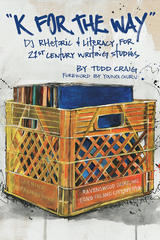
Using material from a larger qualitative research study that illustrates the Hip Hop DJ as a twenty-first-century new media reader, writer, and literary critic, Craig blends interviews from prominent and influential DJs in the Hip Hop community with narrative and interdisciplinary scholarship from writing studies, Hip Hop studies, African American studies, urban education, and ethnomusicology. The voices of DJs sit front and center, presenting a revolutionary conversation about writing and communication in the twenty-first century.
Weaving Craig’s life experiences with important discussions of racial literacies, “K for the Way” is a layered and utterly singular exploration of culture, identity, and literacy in America.

This anthology of 55 keyboard works provides an instructive picture of the music of the young J. S. Bach within the context of a spectrum of works by his elder contemporaries.
The Andreas Bach Book and the so-called Möller Manuscript, the most important sources for the young Bach’s keyboard music, were compiled in the early eighteenth century by Bach’s eldest brother and only keyboard teacher, Johann Christoph Bach of Ohrdruf, himself a pupil of Johann Pachelbel. The significance of the two manuscripts lies not only in their close connection to J. S. Bach (as evidenced by Bach autographs in both books), but equally in the fact that they contain some of the most outstanding keyboard music by Bach’s North German colleagues: Georg Böhm, Dietrich Buxtehude, and Johann Adam Reincken. While some of these compositions have been published in modern editions, others have been entirely overlooked.
This anthology presents keyboard works by the young J. S. Bach which are either little known or are earlier versions of better known works (for example, the Passacaglia in C Minor, BWV 582). Also included are all the unpublished keyboard works in the two manuscripts, as well as works by lesser known composers for which modern editions are not easily accessible. Rounding out the picture are works by well-known contemporaries for which the transmission in the young Bach’s circle proves particularly significant.
Intended for both player and scholar, this edition offers the texts of the two manuscripts in an easy to read layout that emphasizes the clarity of the counterpoint. Of particular interest to organists is the presentation of the organ works in the appropriate notion of the time, on two staves with the pedal voice integrated in the bass staff.

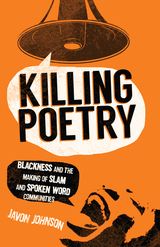
Co-winner of the 2018 Ethnography Division’s Best Book from the NCA
In recent decades, poetry slams and the spoken word artists who compete in them have sparked a resurgent fascination with the world of poetry. However, there is little critical dialogue that fully engages with the cultural complexities present in slam and spoken word poetry communities, as well as their ramifications.
In Killing Poetry, renowned slam poet, Javon Johnson unpacks some of the complicated issues that comprise performance poetry spaces. He argues that the truly radical potential in slam and spoken word communities lies not just in proving literary worth, speaking back to power, or even in altering power structures, but instead in imagining and working towards altogether different social relationships. His illuminating ethnography provides a critical history of the slam, contextualizes contemporary black poets in larger black literary traditions, and does away with the notion that poetry slams are inherently radically democratic and utopic.
Killing Poetry—at times autobiographical, poetic, and journalistic—analyzes the masculine posturing in the Southern California community in particular, the sexual assault in the national community, and the ways in which related social media inadvertently replicate many of the same white supremacist, patriarchal, and mainstream logics so many spoken word poets seem to be working against. Throughout, Johnson examines the promises and problems within slam and spoken word, while illustrating how community is made and remade in hopes of eventually creating the radical spaces so many of these poets strive to achieve.
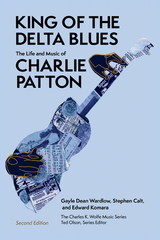
Born 130 years ago in the heart of Mississippi, Charlie Patton (c. 1891–1934) is considered by many to be a father of the Delta blues. With his bullish baritone voice and his fluid slide guitar touch, Patton established songs like “Pony Blues,” “A Spoonful Blues,” and “High Water Everywhere” in the blues lexicon and, through his imitators, in American music. But over the decades, his contributions to blues music have been overshadowed in popularity by those of Robert Johnson, Muddy Waters, and other mid-century bluesmen and women who’ve experienced a resurgence in their music. King of the Delta Blues Singers, originally published in 1988, began a small renaissance in blues and Patton research and set a new scholarly precedent touching even the spelling his name—which, to Patton himself, was "Charlie," not the "Charley" of the early records. And now, with the wide availability of Patton’s complete discography in multiple formats, this revised second edition brings the legend of Charlie Patton into a clarity of detail that was previously impossible.
Gayle Dean Wardlow and the late Stephen Calt (1946–2010) originally probed Patton’s career in the Mississippi Delta, his early performances and recordings, and his musical legacy that continues to influence today’s guitarists and performers, including such musicians as Jack White and Larkin Poe. For this second edition, Wardlow and Edward Komara refined the text and rewrote major sections, updating them with new scholarship on Patton and Delta blues. And finally, Komara has added a new afterword bringing Patton into the contemporary blues conversation and introducing numerous musical examples for the modern researcher and musician.
The second edition of King of the Delta Blues Singers will further cement Patton’s legacy among important blues musicians, and it will be of interest to anyone absorbed in the beginnings of the Delta blues and music biographies.
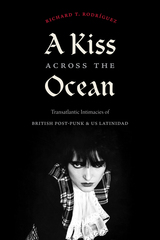
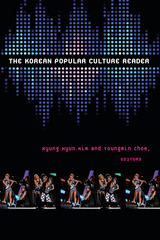
Contributors. Jung-hwan Cheon, Michelle Cho, Youngmin Choe, Steven Chung, Katarzyna J. Cwiertka, Stephen Epstein, Olga Fedorenko, Kelly Y. Jeong, Rachael Miyung Joo, Inkyu Kang, Kyu Hyun Kim, Kyung Hyun Kim, Pil Ho Kim, Boduerae Kwon, Regina Yung Lee, Sohl Lee, Jessica Likens, Roald Maliangkay, Youngju Ryu, Hyunjoon Shin, Min-Jung Son, James Turnbull, Travis Workman
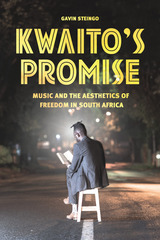
Politicians and cultural critics have long criticized kwaito for failing to provide any meaningful contribution to a society that desperately needs direction. As Steingo shows, however, these criticisms are built on problematic assumptions about the political function of music. Interacting with kwaito artists and fans, he shows that youth aren’t escaping their social condition through kwaito but rather using it to expand their sensory realities and generate new possibilities. Resisting the truism that “music is always political,” Steingo elucidates a music that thrives on its radically ambiguous relationship with politics, power, and the state.
READERS
Browse our collection.
PUBLISHERS
See BiblioVault's publisher services.
STUDENT SERVICES
Files for college accessibility offices.
UChicago Accessibility Resources
home | accessibility | search | about | contact us
BiblioVault ® 2001 - 2024
The University of Chicago Press









